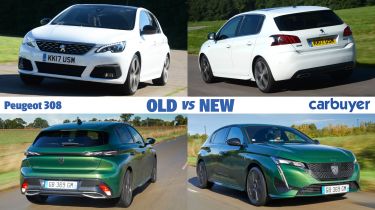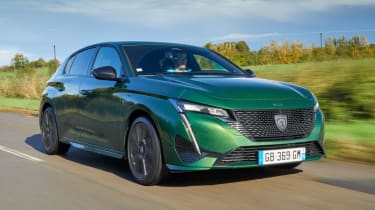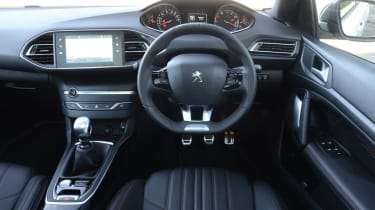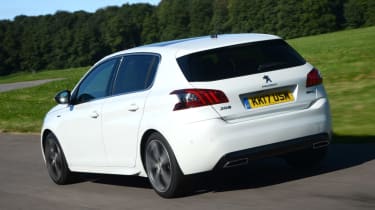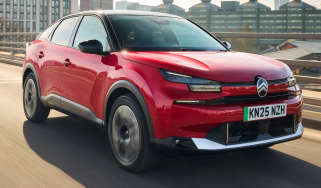Peugeot 308: old vs new
The new 2022 Peugeot 308 hatchback is now on sale but should you buy a used 308 instead?
Now in its third generation, the Peugeot 308 is available as a hatchback or estate and rivals cars like the Volkswagen Golf, Ford Focus, SEAT Leon and Kia Ceed. We’re focusing on the second and third-generation cars in this comparison, to see whether the brand-new 2022 Peugeot 308 is a better buy than a used example of the outgoing model. You can also read our buyer’s guide for the Mk1 308 here.
The second-gen Peugeot 308, sold from 2013 to 2021, was a lot more stylish than its predecessor. Lots of competitive rivals meant cars in this class had to be distinctive, while the classy interior was an indication that the brand was trying hard to appeal to buyers who might’ve also considered a Mercedes A-Class or BMW 1 Series. It’s a practical car and, if you need more space, there’s also the Peugeot 308 SW estate.
 The top 10 best family cars 2025
The top 10 best family cars 2025
Peugeot has been tasked with becoming the upmarket brand in the Stellantis stable of manufacturers, so the new model looks great, gets far more technology and is available as a plug-in hybrid. This time around, the 308 also has to face off against SUVs and electrified cars, so time will tell whether it can sway buyers away from cars like the Volkswagen ID.3 and Peugeot’s own 2008 SUV.
Styling
When the 2013 Peugeot 308 was launched, it introduced a new look that made it much more appealing than the car it replaced. High-spec cars got LED daytime running lights and eye-catching alloy-wheel designs, plus claw-like tail-lights that paid homage to Peugeot’s lion logo. A facelift freshened things up in 2017, with a new grille design and alloy wheels, but by the time it was replaced, it was starting to look a little dated. No wonder, when it shared a showroom with the new Peugeot 208 and 2008.
The Peugeot 308 has now been brought bang up to date, with slim headlights, scything LED slashes and a grille that somehow makes the car look like it’s in motion even when stationary. The new 308 is also the first outing for Peugeot’s new badge, which harks back to some of Peugeot’s classic emblems. There are other new design elements too, even though the side profile looks quite similar. While most companies will give you flat white as the one no-cost paint choice, Peugeot throws in a glorious Olivine Green metallic paint shade as standard.
Interior
The previous 308 was one of the first Peugeots to feature its i-Cockpit cabin, with dials mounted high and a small steering wheel sitting almost in your lap. It had a quite minimalist feel, largely because the climate controls had vanished from the centre console and were contained within the touchscreen. The screen is angled towards the driver but looks a little wonky as a result, and it made changing the temperature more difficult than it needed to be. The plastics are good quality and there’s a huge amount of standard equipment fitted, which we’ll come to further down the page.
Peugeot has continued with its i-Cockpit setup but it’s been refined for the new car. High-spec models get cool 3D graphics on the digital instrument cluster, while more drivers should be able to get a comfortable driving position and still see the dials. A new 10-inch touchscreen is bigger and quicker-to-load than before, and the addition of a panel with shortcuts makes it easier to use. In terms of material quality, it feels very close to an Audi A3.
Practicality
Whether you’ll like the Mk2 Peugeot 308 may depend on how you prioritise passenger and luggage space. There’s not much space in the back seats, so it’ll feel cramped for four adults and installing a bulky child seat might mean the front seat needs to be slid forward. But the boot is vast: at 470 litres, it’s far bigger than the 380-litre space you get in the SEAT Leon, Volkswagen Golf and Ford Focus, not to mention a couple of estate cars. Speaking of estates, the Peugeot 308 SW is available if you need even more luggage space, with a near-class-leading 660-litre loadbay.
It’s rare that a new car will come with a smaller boot than the one before it but that’s the case with the new 308. It boasts a 412-litre boot, as Peugeot has chosen a different balance of interior and boot space. There’s more space for passengers now but it’s still not the most spacious hatchback on sale. The new 308 SW estate offers 608 litres of boot space, or 548 if you choose the plug-in hybrid versions. That’s pretty good for a hybrid; the Skoda Octavia Estate only offers 490 litres if you choose the hybrid engine.
Engines
The previous Peugeot 308 was offered with a fairly wide choice of petrol engines and two diesels. A 1.2-litre PureTech petrol made up the bulk of the range, with three power outputs. The 108bhp and 128bhp versions get a turbocharger, so they’re much more capable of keeping up with traffic, yet they’ll still return over 50mpg. A 221bhp 1.6-litre GT model is capable of 0-62mph in 7.5 seconds, although you’ll rarely get as high as 40mpg in fuel economy. As for diesel engines, a 128bhp 1.5-litre engine is fitted in newer models, replacing the old 1.6, and GT buyers could choose an auto-only 2.0-litre diesel with 178bhp. They’ll return up to 65mpg and 50mpg respectively.
Topping the range was the Peugeot 308 GTi, a hot hatchback that rivalled the Renault Megane RS, Ford Focus ST and Hyundai i30 N. The same 1.6-litre petrol as the GT was pumped up to 268bhp, and can hit 0-62mph in just six seconds. Both the GT and GTi are quite rare.
In the new car, the 128bhp petrol and diesel engines are carried over but they’re joined by two plug-in hybrid versions with either 178bhp or 222bhp. These manage up to 37 miles of electric-only driving and give a good turn of pace but are more suited to company-car drivers, as they’re quite expensive for private customers. It’s worth noting that you can now only have a Peugeot 308 with an automatic gearbox; there’s no manual option.
Prices and specs
In order to make the second-gen 308 competitive, Peugeot chose to stuff it with standard equipment. Even the Active Premium model at the cheaper end of the range came with alloy wheels, two-zone air conditioning, rear parking sensors, and auto lights and wipers. Newer cars in this spec also get Apple CarPlay and Android Auto. Allure and Allure Premium are next, offering extra kit like front parking sensors and keyless entry. The Peugeot 308 GT Line is a sporty option with a body kit and more technology, including a reversing camera and LED headlights.
Prices for a used Peugeot 308 start at under £8,000 on BuyaCar, while a 2021 Allure can be bought for £20,000. You’ll need around £3,500 more for a GT model.
The new 308 continues the high levels of equipment, with LED lights, a 10-inch touchscreen and lane-keeping assist as standard. The Peugeot 308 Allure now gets sat nav and online features; Allure Premium adds adaptive cruise control, Apple and Android connectivity and wireless phone charging. GT and GT Premium have 3D dials, a heated steering wheel and, latterly, massaging seats. Because the 308 now only comes with an automatic gearbox, prices have risen; the car starts at around £24,000 and the hybrid starts at £33,000.
Verdict
The last 308 is a sensible, economical, well-equipped car with interesting details inside and out, but the new one appeals to the heart as well as the head. Perhaps it won’t be quite so eye-catching when it’s a more familiar sight on our roads but for now the new 308 will draw attention like few other family hatchbacks. The plug-in hybrid opens the 308 up for company-car users and private buyers keen to experience electrification, and has the potential for incredibly low running costs (even if it’s expensive in the first place). If you can wait for the car to arrive, we’d recommend going for a new 308.
Read our guides to the best hatchbacks and best plug-in hybrids.
Recommended

SEAT releases new Black Edition models with sportier styling
Most Popular

Suzuki’s new 10-year warranty is free – here’s how to get it
Tips & advice

Car dashboard warning lights: what does each symbol mean?

Electric car charging stations: public networks, charger types, apps and maps


